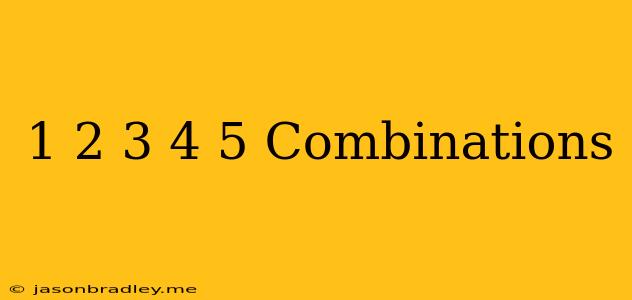Exploring the Possibilities: Combinations of 1, 2, 3, 4, and 5
The seemingly simple set of numbers 1, 2, 3, 4, and 5 holds a surprising amount of potential for combinations. Let's delve into the world of possibilities, exploring different ways these five digits can be arranged and manipulated.
Basic Combinations
- Permutations: If order matters, we're talking about permutations. There are 120 different ways to arrange these five numbers (5!).
- Combinations: If order doesn't matter, we're talking about combinations. For example, selecting three numbers from the set (without repetition) yields 10 distinct combinations.
Expanding the Possibilities
- Repetitions Allowed: When we allow repetition of numbers, the number of combinations explodes. For example, using the five digits to create a three-digit code (with repetition allowed), we have 125 possible combinations (5 x 5 x 5).
- Operations: Introducing basic mathematical operations like addition, subtraction, multiplication, and division opens up even more possibilities. We can create equations, explore relationships, and uncover unique patterns. For instance, we can explore how many ways we can get a specific sum by adding any combination of these numbers.
Beyond the Basics
- Sequences: These numbers can form the basis of interesting sequences. For example, the Fibonacci sequence (1, 1, 2, 3, 5…) uses these digits in its early terms.
- Mathematical Concepts: These five numbers serve as building blocks for exploring mathematical concepts like prime factorization, modular arithmetic, and even more complex ideas like number theory.
The Importance of Combinations
Understanding combinations has broad applications across many fields:
- Computer Science: Combinations are fundamental to areas like cryptography, data structures, and algorithm design.
- Probability and Statistics: Combinations help us calculate probabilities and analyze data.
- Real-World Scenarios: Combinations play a role in everything from lottery drawings to password generation to scheduling events.
The seemingly simple act of manipulating five digits reveals a universe of possibilities. By exploring combinations, we develop a deeper understanding of mathematical concepts and gain valuable tools for tackling complex problems in various fields.
